Njengamartin399
On this page, you find all documents, package deals, and flashcards offered by seller njengamartin399.
- 141
- 0
- 7
Community
- Followers
- Following
148 items
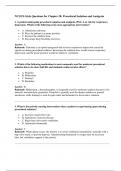
Procedural Sedation and Analgesia
1. A patient undergoing procedural sedation and analgesia (PSA) is at risk for respiratory depression. Which of the following is the most appropriate intervention? • A. Administer naloxone. • B. Place the patient in a prone position. • C. Increase the sedation dose. • D. Encourage deep breathing exercises. Answer: A Rationale: Naloxone is an opioid antagonist that reverses respiratory depression caused by opioid use during procedural sedation. Increasing the sedation dose would wor...
- Exam (elaborations)
- • 19 pages •
1. A patient undergoing procedural sedation and analgesia (PSA) is at risk for respiratory depression. Which of the following is the most appropriate intervention? • A. Administer naloxone. • B. Place the patient in a prone position. • C. Increase the sedation dose. • D. Encourage deep breathing exercises. Answer: A Rationale: Naloxone is an opioid antagonist that reverses respiratory depression caused by opioid use during procedural sedation. Increasing the sedation dose would wor...
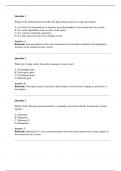
Core Curriculum for Pain Management Nursing
questions on all chapters regarding Core Curriculum for Pain Management Nursing
- Package deal
- • 19 items •
- Physiology of Pain • Exam (elaborations)
- Current Pain Theories • Exam (elaborations)
- Mental Health Disorders and Pain • Exam (elaborations)
- Essential Ethics for Pain Management Nursing • Exam (elaborations)
- Impact of Pain and Benefits of Pain Management • Exam (elaborations)
- And more ….
questions on all chapters regarding Core Curriculum for Pain Management Nursing
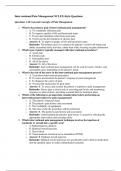
Interventional Pain Management
1. What is the primary goal of interventional pain management? o A. To completely eliminate pain o B. To improve quality of life and functional status o C. To provide immediate relief from acute pain o D. To prevent the development of chronic pain o Answer: B. To improve quality of life and functional status Rationale: The primary goal is to enhance the patient's overall well-being and ability to perform daily activities, rather than solely focusing on pain elimination. 2. Which type o...
- Package deal
- Exam (elaborations)
- • 12 pages •
1. What is the primary goal of interventional pain management? o A. To completely eliminate pain o B. To improve quality of life and functional status o C. To provide immediate relief from acute pain o D. To prevent the development of chronic pain o Answer: B. To improve quality of life and functional status Rationale: The primary goal is to enhance the patient's overall well-being and ability to perform daily activities, rather than solely focusing on pain elimination. 2. Which type o...
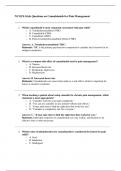
Cannabinoids for Pain Management
1. Which cannabinoid is most commonly associated with pain relief? o A. Tetrahydrocannabinol (THC) o B. Cannabidiol (CBD) o C. Cannabinol (CBN) o D. Delta-8-tetrahydrocannabinol (Delta-8 THC) Answer: A. Tetrahydrocannabinol (THC) Rationale: THC is the primary psychoactive compound in cannabis and is known for its analgesic properties. ________________________________________ 2. What is a common side effect of cannabinoids used in pain management? o A. Nausea o B. Increased heart rate ...
- Package deal
- Exam (elaborations)
- • 17 pages •
1. Which cannabinoid is most commonly associated with pain relief? o A. Tetrahydrocannabinol (THC) o B. Cannabidiol (CBD) o C. Cannabinol (CBN) o D. Delta-8-tetrahydrocannabinol (Delta-8 THC) Answer: A. Tetrahydrocannabinol (THC) Rationale: THC is the primary psychoactive compound in cannabis and is known for its analgesic properties. ________________________________________ 2. What is a common side effect of cannabinoids used in pain management? o A. Nausea o B. Increased heart rate ...
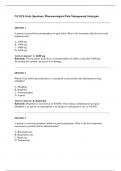
Pharmacological Pain Management Strategies
A patient is prescribed acetaminophen for pain relief. What is the maximum daily dose to avoid hepatotoxicity? A. 2,000 mg B. 3,000 mg C. 4,000 mg D. 5,000 mg Correct Answer: C. 4,000 mg Rationale: The maximum daily dose of acetaminophen for adults is typically 4,000 mg. Exceeding this amount can lead to liver damage. ________________________________________ Question 2 Which of the following medications is considered a nonsteroidal anti-inflammatory drug (NSAID)? A. Morphine B. Ibupro...
- Package deal
- Exam (elaborations)
- • 16 pages •
A patient is prescribed acetaminophen for pain relief. What is the maximum daily dose to avoid hepatotoxicity? A. 2,000 mg B. 3,000 mg C. 4,000 mg D. 5,000 mg Correct Answer: C. 4,000 mg Rationale: The maximum daily dose of acetaminophen for adults is typically 4,000 mg. Exceeding this amount can lead to liver damage. ________________________________________ Question 2 Which of the following medications is considered a nonsteroidal anti-inflammatory drug (NSAID)? A. Morphine B. Ibupro...
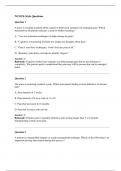
Psychosocial Interventions for Pain Management
Question 1 A nurse is teaching a patient about cognitive-behavioral strategies for managing pain. Which statement by the patient indicates a need for further teaching? A. "I can use relaxation techniques to help manage my pain." B. "Cognitive restructuring will help me change my thoughts about pain." C. "Once I start these techniques, I won't feel any pain at all." D. "Keeping a pain diary can help me identify triggers." Answer: C Rationale: Cognitive-behavioral...
- Package deal
- Exam (elaborations)
- • 25 pages •
Question 1 A nurse is teaching a patient about cognitive-behavioral strategies for managing pain. Which statement by the patient indicates a need for further teaching? A. "I can use relaxation techniques to help manage my pain." B. "Cognitive restructuring will help me change my thoughts about pain." C. "Once I start these techniques, I won't feel any pain at all." D. "Keeping a pain diary can help me identify triggers." Answer: C Rationale: Cognitive-behavioral...
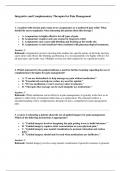
Integrative and Complementary Therapies for Pain Management
1. A patient with chronic pain wants to try acupuncture as a method of pain relief. What should the nurse emphasize when educating the patient about this therapy? • A. Acupuncture is highly effective for all types of pain. • B. Acupuncture requires only one session for long-term relief. • C. Acupuncture may cause mild bleeding and bruising at the needle site. • D. Acupuncture is only beneficial when combined with pharmacological treatments. Answer: C Rationale: Acupuncture involves...
- Package deal
- Exam (elaborations)
- • 20 pages •
1. A patient with chronic pain wants to try acupuncture as a method of pain relief. What should the nurse emphasize when educating the patient about this therapy? • A. Acupuncture is highly effective for all types of pain. • B. Acupuncture requires only one session for long-term relief. • C. Acupuncture may cause mild bleeding and bruising at the needle site. • D. Acupuncture is only beneficial when combined with pharmacological treatments. Answer: C Rationale: Acupuncture involves...
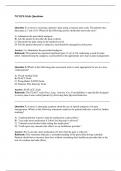
Overview of Pain Assessment, Management, and Select Clinical Practice Guidelines
Question 1: A nurse is assessing a patient’s pain using a numeric pain scale. The patient rates their pain as 7 out of 10. Which of the following actions should the nurse take next? A) Administer the prescribed analgesic. B) Ask the patient to describe the pain in detail. C) Document the pain rating in the medical record. D) Tell the patient that pain is subjective and should be managed by distraction. Answer: A) Administer the prescribed analgesic. Rationale: The patient has reported si...
- Package deal
- Exam (elaborations)
- • 19 pages •
Question 1: A nurse is assessing a patient’s pain using a numeric pain scale. The patient rates their pain as 7 out of 10. Which of the following actions should the nurse take next? A) Administer the prescribed analgesic. B) Ask the patient to describe the pain in detail. C) Document the pain rating in the medical record. D) Tell the patient that pain is subjective and should be managed by distraction. Answer: A) Administer the prescribed analgesic. Rationale: The patient has reported si...
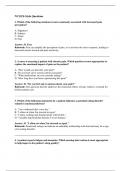
Intrapersonal Relationships/Influences of Emotions, Sleep, Fatigue, Nutrition, Obesity, and Eating Disorders With Pain
1. Which of the following emotions is most commonly associated with increased pain perception? A. Happiness B. Sadness C. Anger D. Fear Answer: D. Fear Rationale: Fear can amplify the perception of pain, as it activates the stress response, leading to increased muscle tension and pain sensitivity. ________________________________________ 2. A nurse is assessing a patient with chronic pain. Which question is most appropriate to explore the emotional impact of pain on the patient? A. "...
- Package deal
- Exam (elaborations)
- • 18 pages •
1. Which of the following emotions is most commonly associated with increased pain perception? A. Happiness B. Sadness C. Anger D. Fear Answer: D. Fear Rationale: Fear can amplify the perception of pain, as it activates the stress response, leading to increased muscle tension and pain sensitivity. ________________________________________ 2. A nurse is assessing a patient with chronic pain. Which question is most appropriate to explore the emotional impact of pain on the patient? A. "...
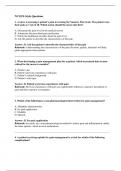
Risk Assessments Related to Pain Management
1. A nurse is assessing a patient’s pain level using the Numeric Pain Scale. The patient rates their pain as 7 out of 10. Which action should the nurse take first? A. Document the pain level in the medical record B. Administer the prescribed pain medication C. Notify the healthcare provider about the pain level D. Ask the patient to describe the characteristics of the pain Answer: D. Ask the patient to describe the characteristics of the pain Rationale: Understanding the characteristics ...
- Package deal
- Exam (elaborations)
- • 16 pages •
1. A nurse is assessing a patient’s pain level using the Numeric Pain Scale. The patient rates their pain as 7 out of 10. Which action should the nurse take first? A. Document the pain level in the medical record B. Administer the prescribed pain medication C. Notify the healthcare provider about the pain level D. Ask the patient to describe the characteristics of the pain Answer: D. Ask the patient to describe the characteristics of the pain Rationale: Understanding the characteristics ...
